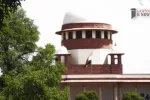Supreme Court Holds Subsequent Buyer of Acquired Land Cannot Claim Acquisition Has Lapsed

In a significant judgment, the Supreme Court of India has ruled that a subsequent buyer of land, who purchased the property after the completion of the acquisition process, does not have the legal standing to claim that the acquisition has lapsed. The court held that the rights under Section 24(2) of the Right to Fair Compensation and Transparency in Land Acquisition, Rehabilitation and Resettlement Act, 2013 (“the 2013 Act”) are only available to the recorded owners at the time of the issuance of the notification under Section 4 of the Land Acquisition Act, 1894.
The case, titled Government of NCT of Delhi v. Ravinder Kumar Jain & Ors., arose from a challenge to an order passed by the High Court of Delhi. The High Court had allowed a writ petition filed by respondent no. 1, Ravinder Kumar Jain, invoking Section 24(2) of the 2013 Act, holding that the acquisition had lapsed due to non-possession of the land and non-payment of compensation.
The appellant, the Government of NCT of Delhi, contended that the subsequent buyer, respondent no. 1, did not have the right to invoke Section 24(2) of the 2013 Act as he purchased the land after the acquisition process was completed. They relied on the judgment in Shiv Kumar and Ors. v. Union of India and Ors., which established that subsequent buyers cannot claim the benefits of Section 24(2) and challenge the acquisition proceedings.
On the other hand, respondent no. 1 argued that he had constructed his house on the acquired land and had been living there for over a decade. He contended that depriving him of possession at this stage would be unduly harsh, especially considering that he had obtained permission under the Delhi Lands (Restrictions on Transfer) Act, 1972. He asserted that the sale deed was registered after due permission was granted by the competent authority.
After considering the arguments, the Supreme Court examined the factual background of the case. The acquisition process had commenced with the issuance of a notification under Section 4 of the Land Acquisition Act, 1894, in 1980. The original owner of the land had challenged the acquisition through a writ petition, which was later dismissed. Respondent no. 1 subsequently purchased the land in 2003 and also filed a writ petition challenging the acquisition, which was later withdrawn.
The court referred to its previous judgments, including Shiv Kumar’s case, which held that subsequent buyers cannot claim rights under Section 24(2) of the 2013 Act. It emphasized that purchases made after the issuance of the notification under Section 4 of the 1894 Act are void against the state, and subsequent buyers cannot seek to challenge the acquisition proceedings.
The Supreme Court also noted that subsequent legislation, such as the 2013 Act, does not confer any new rights on purchasers based on void transactions. The purpose of the 2013 Act is to provide just and fair compensation and rehabilitation to affected persons whose land has been acquired or is proposed to be acquired. Therefore, subsequent buyers cannot be considered as landowners entitled to restoration of land or claiming benefits under the 2013 Act.
Supreme Court allowed the appeal and set aside the High Court’s order. The writ petition filed by respondent no. 1 was dismissed. The court clarified that possession of the land and payment of compensation are essential for a valid acquisition, and if either of these requirements is not fulfilled, the acquisition may be considered as having lapsed.
D.D-18.May.2023
Government of NCT of Delhi vs Ravinder Kumar Jain & Ors.






